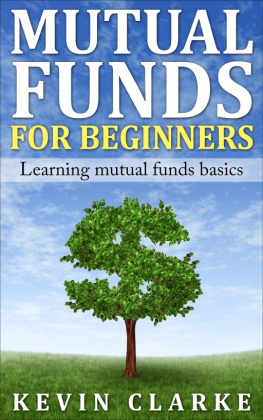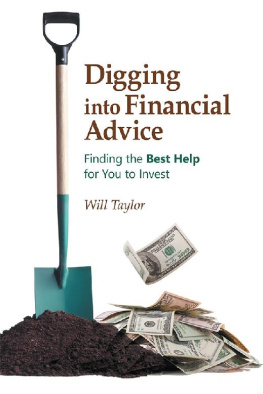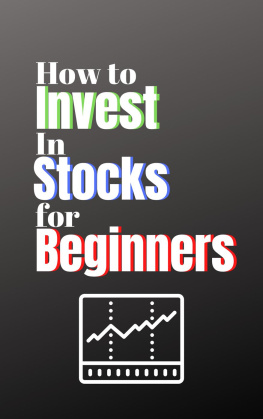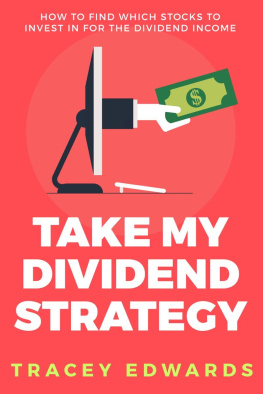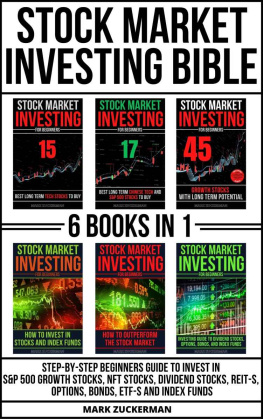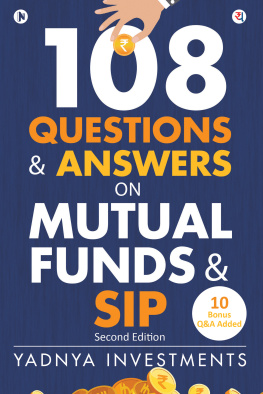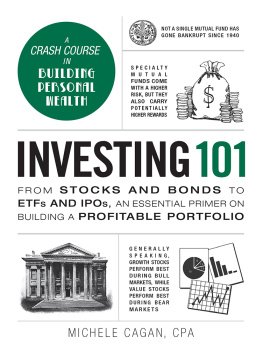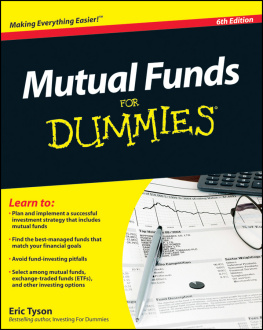Mutual Funds for Beginners LearningMutual Funds Basics
Smashwords Edition
Copyright 2015 Kevin Clarke. AllRights Reserved
Table OfContents
Disclaimer: This book contains information regarding generalpersonal finance that is based on authors own knowledge andexperiences. It is published for general reference and is notintended to be a substitute for independent verification by aprofessional financial planner or accountant. The publisher and theauthor disclaim any personal liability, either directly orindirectly, for the information contained within. Although theauthor and the publisher have made every effort to ensure theaccuracy and completeness of the information contained within, weassume no responsibility of errors, inaccuracies, omissions andinconsistencies.
Over the past few decades,Americans have increasingly turned to mutual funds as a way ofsaving for retirement and achieving other financialgoals.
Mutual funds offer thediversification of your portfolio with the perhaps added advantageof professional investment management. A lot of beginners willconsider professional management to be a benefit.
However, as with any otherinvestment choice, mutual fund investment does come with its shareof risks and drawbacks. The fees and taxes involved usuallydiminish the overall return on investment of the fund.
Before investing in anyfund, it pays to understand the upsides and downsides of the planas well as how to identify the investment vehicle that matches yourgoals and ability to tolerate risk.
This book explains thebasics of what mutual funds are, the different types available, howthey work, factors to consider before investing in them, makingwise investments, and industry regulations.
Chapter 1: INTRODUCTION TO MUTUAL FUNDS
Mutual fund investing hasonly grown in popularity over the past couple of decades. Thisinvestment option is popular because it makes it easier for smallerinvestors to place their money in a diversified pool ofsecurities.
As mutual fund investmentsevolve over time, many questions have come up concerning theirnature of operation as well as the features of thesefunds.
By definition, a mutualfund is a pool of money that is managed for several investors by aprofessional finance manager. The manager is given theresponsibility of investing the money on stocks, bonds and othersecurities based on the specific investment goals that have beenestablished for the fund.
When you invest in amutual fund, you will receive shares in return for your money. Themore shares you purchase, the higher percentage of the fund youwill own.
On the other hand, thefund manager charges a commission based on the value of the fundsassets in return for managing and administering the fund and itsinvestment portfolio.
Mutual funds are typicallyopen-ended investment funds, meaning that new investors can come onboard and contribute to the pool at any time.
Existing investors canalso reinvest their shares into the pool or redeem them at anytime. When you choose to redeem your shares from the fund, you willreceive a check based on the current market value of the fundsportfolio.
The Structure Of MutualFunds
A mutual fund isstructured like a corporation or a business trust. This means thatlike any other corporation, mutual funds are owned by theshareholders.
These funds are externallymanaged, so they do not have employees. Instead, mutual funds arerun by affiliate organizations and independentcontractors.
Here are the parties thatare involved in the running and operation of a mutualfund.
-The mutual fund manager:He is responsible for establishing the mutual fund, marketing andoverseeing its general administration.
-Portfolio adviser: Thisis the professional finance manager appointed by the Fund Managerto oversee the funds investment options. The mutual fund managercan also act as the portfolio adviser.
-Principal Distributor:This person is responsible for coordinating the sale of the fundsto investors directly or through registered dealers.
-Custodian: This is thebank of the trust company appointed by the Mutual Fund Manager tohold the securities owned by the fund.
-Transfer agent andregistrar: This person is responsible for maintaining the list ofinvestors or shareholders in the fund.
-Auditor: This is anindependent auditor contracted by the mutual fund manager toconduct an annual audit and provide a report on the fundsfinancial statement.
-Trustee: This is theentity that has the title to the funds securities on behalf of theshareholders in cases where the funds are organized as trustsrather than corporations
Characteristics Of MutualFunds
Some key distinguishingfeatures of mutual funds include:
-As an investor, you willpurchase mutual fund shares directly from the fund or through abroker rather than from secondary investors on a secondary marketsuch as Nasdaq or New York Stock Exchange.
-The price that you willpay for your shares is the funds per share net asset value (NAV)and any shareholder fee that the fund will impose at the time ofpurchase such as sales loads.
-You can redeem yourmutual fund shares by selling your shares back to the fund or to abroker acting on behalf of the fund.
-Generally, mutual fundsaccommodate new investors by creating and selling new shares. Inother words, shares are sold on a continuous basis. However, somefunds may stop selling when they become too large.
-Mutual funds investmentportfolios are managed by separate entities referred to asinvestment advisers that are registered with the Securities andExchange Commission (SEC).
The Advantages AndDisadvantages Of Investing In Mutual Funds
Every investment comeswith its share of pros and cons. However, it is important to notethat the features that are attractive to one investor may not beappealing to you. For most investors, mutual funds are anattractive investment platform because of the followingfeatures.
A. ProfessionalManagement
Even under ideal marketconditions, it takes a skilled and experienced investor to make theright investment decisions, and additional commitment of time tomonitor those investments on a regular basis.
Through mutual funds,professional investors manage a portfolio of securities on a fulltime basis on your behalf, deciding the best securities to buy andsell after extensive research.
These investors take theirtime to find investments that best match the funds objectives. Asthe markets and economic conditions change, these investors adjustthe mix of the funds investments to ensure that they are in linewith the funds goals.
B.Diversification
Savvy investors know thatdiversification can help reduce the risk of a single investment.Through mutual fund investing, you will automatically diversifyyour investment portfolio by holding a variety ofsecurities.
In addition, since youwill be pooling your assets along with those of other investors,this investment option allows you to have a diversified portfoliothat will be managed on your behalf at a fraction of thecost.
In short, mutual fundinvesting allows you to invest in several markets and sectors ofthe economy.
C. Variety
You can choose among avariety of investment approaches from the broad categories of bond,stock and money market funds. Today, there are over 8000 mutualfunds available in the United States with various styles and goalsto fit just about every circumstance and investmentobjective.
D. Low Cost
Through mutual fundinvestment, you can own several securities through a singleplatform. As an investor, you will primarily pay a fee for thisservice based on your accounts total value.
Since the mutual fundindustry is made up of several competing firms and thousands offunds, the actual level of fees will definitely vary from fund tofund. However, mutual fund investing provides you with professionalmanagement and diversification at a fraction of what it would costyou to make such investments on your own.
Next page
